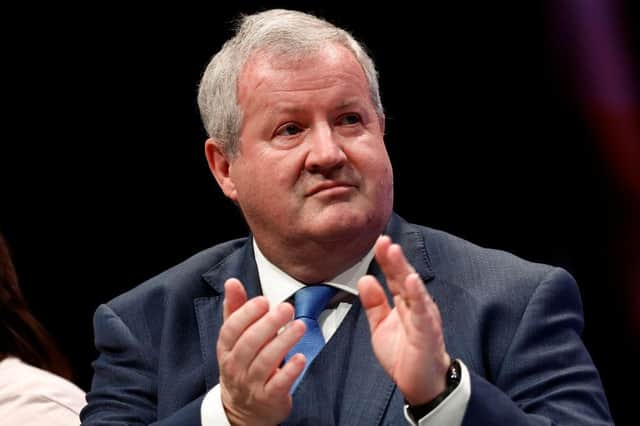Ian Blackford warns inflation will do ‘lasting damage’ and claims UK hasn’t learnt lessons from 2008 financial crisis


Ian Blackford has warned inflation will do “lasting damage to living standards” and claimed politicians have not learned the required lessons from the 2008 financial crisis.
The former SNP Westminster leader claimed the event, which saw a 7.4 per cent fall in Britain’s GDP, had created the conditions for today’s economic issues.
Advertisement
Hide AdAdvertisement
Hide AdHe called for a more sustainable approach to growth, criticising successive Tory Governments for “balancing the books through the pockets of the poor”
Speaking to Scotland on Sunday, he said: “In many respects the problems we face today are because of the wrong choices that were made then, we are now paying the price for that.
“If you think about where we are today, the young generation are the first in 200 years to be worse off than their parents. We are going backwards in terms of living standards, young people have a mountain of doubt, there’s high mortgage costs, and most of the UK has student debt or fees. It’s an enormous burden that young people are facing.
“What we have faced since 2008 is an inability by the tail end of a Labour Government, then the coalition and now the current Government to deliver sustainable economic growth.
“The demands on the public purse are so great but we are not growing taxation receipts to meet the needs of people.
“The failure for that goes right back to the financial crisis. We did the right thing in bailing out the banks, if we hadn’t we would have all paid the price.”
Mr Blackford explained issues began to arise due to the quantitative easing program deployed in 2009, which saw banks buying bonds to push up their prices and bring down long-term interest rates. The Ross, Skye and Lochaber MP explained this drove up asset prices, essentially only helping those already well off.
He said: “Those that had assets, those that were wealthy did extremely well. We had all that money from easing, that drove up these asset prices, but we had fiscal tightening at the same time.
Advertisement
Hide AdAdvertisement
Hide Ad“The most vulnerable paid the price for austerity, while those who had economic assets were protected.
“We have seen just a complete mismatch between monetary policy and fiscal policy. You never cut your way out of a recession. What we needed to do was have that old fashioned stimulus for the economy, that would have delivered investment in the private sector, increased productivity, lifted living standards, and generated tax receipts to pay off the debts. It is a failure of public policy that we are still feeling”.
Mr Blackford argues this approach to balancing the books has hit the poorest hardest, and failed to deliver the growth in the economy required for long-term prosperity.Pointing to his own experiences in parliament, he raised the issue of working tax credit, which was facing cuts when he was first elected in 2015.
He argued if you had someone working full time with two children at home, if the cuts had come in, their real term income would fall from £19,000 to £13,000.
Mr Blackford said: “In the end we were able to stop much of it, but it showed the mentality of those who were driving at it.
“In essence of what they were doing then, is balancing the books by taking form the pocket of the poor.
“It’s the real scandal of this, why we need a proper living wage, is that too many people in this country are the working poor."They work a hard days shift, that’s now been exacerbated by cost of living crisis, but we’ve lived through this, where for so many people, work hasn’t paid.
"Why should people like me who have assets be bailed out by quantitative easing, while those without pay the price?”.
Advertisement
Hide AdAdvertisement
Hide AdComparing 2008’s financial crisis to today’s economic situation, the former city worker claimed it had left the public finances “stretched to such an extent we do’t have the investment in health and education”He explained: “Wages are getting squeezed. There is that acceleration in a decline in living standards.
“The simple fact is that over the course of the last decade living standards have been going in the wrong direction, cost of living crisis has just exacerbated the challenges that are already there.
“All of us want to get inflation down, it does make people poorer, so there’s a real danger unless we drive inflation down, this is going to do long and lasting damage to people’s living standards. Interest rates will stay high for longer, they may remain for a considerable time, and not reverse very quickly.”
Mr Blackford, who will be stepping down at the next general election, claimed the only solution was to grow the economy.
He explained: “If you create the circumstances where people are investing, then you drive up productivity, that’s how you drive up wages .
“If you show you can grow the economy on a sustainable basis, then you will deliver the tax receipts to fund those essential services.
“We’ve got to break the cycle and drive that investment into the economy. One of the things that is holding us back is Brexit, it has taken the top of the economy off.
“We have lost four per cent of our economy from Brexit, and all the underlying problems that were there have got worse for us.”Now his party’s business ambassador, he claimed green energy was “an opportunity”, with the chance to increase it five fold before 2050. He argued this would create jobs and investment, adding “that’s why you need a coherent industrial strategy”.
